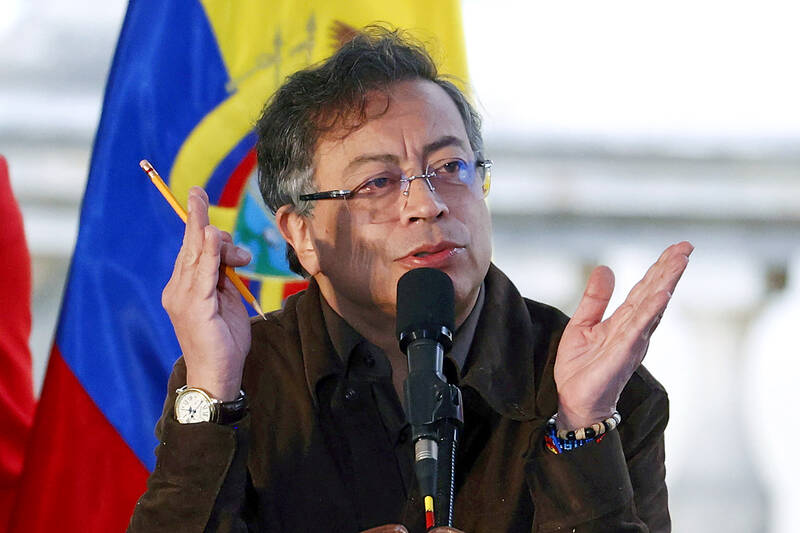Colombian President Gustavo Petro on Saturday accused Washington of violating his country’s sovereignty and killing a fisherman, shortly after US President Donald Trump confirmed that US forces carried out another strike in his military campaign against “narcoterrorists.”
Trump has waged an unprecedented military campaign that he says is aimed at choking the flow of drugs from Latin America to the US.
Washington says its operations have dealt a decisive blow to drug trafficking, but it has provided no evidence that the people killed — at least 27 so far — were drug smugglers.

Photo: EPA
Petro on X said: “US government officials have committed murder and violated our sovereignty in our territorial waters. Fisherman Alejandro Carranza had no ties to drug traffickers and his daily activity was fishing.”
Carranza was reportedly killed by US forces in a strike last month on his boat while he was fishing the Caribbean, according to video testimony of his family members shared by the Colombian president on X.
Experts say such summary killings are illegal even if they target confirmed narcotics traffickers.
“The Colombian boat was adrift and had its distress signal on,” Petro said, referring to the strike that killed Carranza.
“We await explanations from the US government,” he added.
Trump on Saturday said that the US was sending two suspected drug traffickers back to their native Ecuador and Colombia, after a military strike on their “drug-smuggling submarine” in the Caribbean that killed two others.
“It was my great honor to destroy a very large DRUG-CARRYING SUBMARINE that was navigating towards the United States on a well known narcotrafficking transit route,” Trump wrote on his Truth Social platform, adding that the vessel was loaded with fentanyl and other drugs.
“Two of the terrorists were killed. The two surviving terrorists are being returned to their Countries of origin, Ecuador and Colombia, for detention and prosecution,” he said.
Petro confirmed that the Colombian suspect had been repatriated and would face prosecution.
“We are glad he is alive and he will be prosecuted according to the law,” Petro wrote on X.
The 34-year-old Colombian was in serious condition upon his return, according to the Interior Ministry.
“He arrived with brain trauma, sedated, drugged, breathing with a ventilator,” Interior Minister Armando Benedetti said.
At least six vessels, most of them speedboats, have been targeted by US strikes in the Caribbean since September, with Venezuela alleged to be the origin of some of them.
Washington has not revealed the departure point of the alleged drug-smuggling submarine in the latest strike.
Semi-submersibles built in clandestine jungle shipyards have for years been used to ferry cocaine from South America, particularly Colombia, to Central America or Mexico, usually via the Pacific Ocean.
Petro’s government has repeatedly criticized the US campaign. Last month, he called at the United Nations for criminal proceedings to be opened against Trump over the strikes.

REVENGE: Trump said he had the support of the Syrian government for the strikes, which took place in response to an Islamic State attack on US soldiers last week The US launched large-scale airstrikes on more than 70 targets across Syria, the Pentagon said on Friday, fulfilling US President Donald Trump’s vow to strike back after the killing of two US soldiers. “This is not the beginning of a war — it is a declaration of vengeance,” US Secretary of Defense Pete Hegseth wrote on social media. “Today, we hunted and we killed our enemies. Lots of them. And we will continue.” The US Central Command said that fighter jets, attack helicopters and artillery targeted ISIS infrastructure and weapon sites. “All terrorists who are evil enough to attack Americans are hereby warned

Seven wild Asiatic elephants were killed and a calf was injured when a high-speed passenger train collided with a herd crossing the tracks in India’s northeastern state of Assam early yesterday, local authorities said. The train driver spotted the herd of about 100 elephants and used the emergency brakes, but the train still hit some of the animals, Indian Railways spokesman Kapinjal Kishore Sharma told reporters. Five train coaches and the engine derailed following the impact, but there were no human casualties, Sharma said. Veterinarians carried out autopsies on the dead elephants, which were to be buried later in the day. The accident site

‘POLITICAL LOYALTY’: The move breaks with decades of precedent among US administrations, which have tended to leave career ambassadors in their posts US President Donald Trump’s administration has ordered dozens of US ambassadors to step down, people familiar with the matter said, a precedent-breaking recall that would leave embassies abroad without US Senate-confirmed leadership. The envoys, career diplomats who were almost all named to their jobs under former US president Joe Biden, were told over the phone in the past few days they needed to depart in the next few weeks, the people said. They would not be fired, but finding new roles would be a challenge given that many are far along in their careers and opportunities for senior diplomats can

RUSHED: The US pushed for the October deal to be ready for a ceremony with Trump, but sometimes it takes time to create an agreement that can hold, a Thai official said Defense officials from Thailand and Cambodia are to meet tomorrow to discuss the possibility of resuming a ceasefire between the two countries, Thailand’s top diplomat said yesterday, as border fighting entered a third week. A ceasefire agreement in October was rushed to ensure it could be witnessed by US President Donald Trump and lacked sufficient details to ensure the deal to end the armed conflict would hold, Thai Minister of Foreign Affairs Sihasak Phuangketkeow said after an ASEAN foreign ministers’ meeting in Kuala Lumpur. The two countries agreed to hold talks using their General Border Committee, an established bilateral mechanism, with Thailand